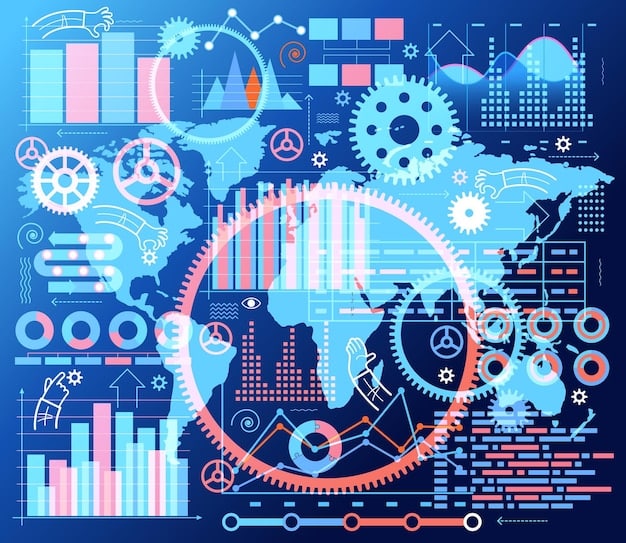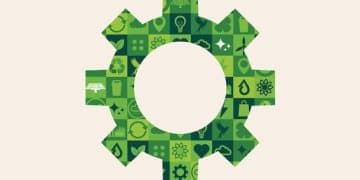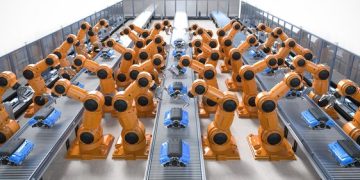Maximize Your Impact: 5 Ways to Leverage Community Events for Professional Growth in 2025

Leveraging community events can significantly enhance professional growth in 2025 by fostering networking, skill development, leadership opportunities, brand building, and staying informed on industry trends, providing a direct pathway to expanded career horizons and collaborative ventures.
In today’s dynamic professional landscape, staying ahead requires more than just mastering your craft; it demands proactive engagement and strategic networking. That’s where community events come in. Learning how to Maximize Your Impact: 5 Ways to Leverage Community Events for Professional Growth in 2025 is not just an option, but a vital strategy for career advancement, opening doors to unforeseen opportunities and accelerating your trajectory.
Strategically Networking: Building Meaningful Connections
Networking is often seen as a buzzword, yet its true power lies in building authentic, lasting relationships rather than simply collecting business cards. Community events offer a prime environment for this, bringing together individuals with shared interests or professional goals. The key is to approach these interactions with genuine curiosity and a desire to connect on a deeper level, transforming fleeting conversations into valuable contacts.
Effective networking at community events transcends the transactional model. It’s about understanding others’ needs and identifying potential synergies. This often means stepping out of your comfort zone, initiating conversations, and actively listening to what others have to say. Remember, every attendee is a potential collaborator, mentor, or even a future client.
Preparing for Productive Engagements
Before attending any event, a bit of preparation can significantly enhance your networking outcomes. Researching the event’s agenda, speakers, and even some key attendees can provide conversation starters and help you identify individuals you’d particularly like to meet. This proactive approach signals professionalism and helps you make the most of your time at the event.
- Set clear goals: Define what you hope to achieve, whether it’s meeting a certain number of new people, finding a mentor, or exploring specific industry trends.
- Craft your elevator pitch: Be ready to clearly and concisely explain who you are, what you do, and what value you offer.
- Have appropriate tools: Ensure you have professional business cards or a digital contact sharing method ready.
Following Up: Cementing New Connections
The true value of networking rarely emerges during the event itself; it’s cultivated through diligent follow-up. A prompt, personalized message after the event can reinforce your connection and demonstrate your respect for their time. This step is crucial for transitioning from a temporary acquaintance to a valuable professional contact.
Consider sending a brief email referencing a specific point of discussion to jog their memory and establish a more personal connection. Offer to share relevant resources or suggest a coffee meeting to explore potential collaborations further. This sustained engagement transforms initial contacts into a robust professional network that can support your growth for years to come.
Skill Development: Learning Beyond the Classroom
Community events are vibrant hubs for acquiring new skills and deepening existing ones, often in ways that formal education cannot replicate. They expose professionals to cutting-edge ideas, diverse perspectives, and practical applications directly from industry leaders and peers. This continuous learning is vital for staying competitive and relevant in an evolving professional landscape.
Whether it’s through workshops, seminars, or informal discussions, the learning opportunities are abundant. These events often feature speakers who are pioneers in their fields, sharing insights that are not yet published in textbooks or academic journals. Engaging with such content offers a unique advantage, providing a forward-looking perspective on industry challenges and innovations.
Targeted Workshops and Seminars
Many community events integrate dedicated workshops and seminars designed to deliver practical skills. These sessions are perfect for hands-on learning, offering actionable strategies and tools that can be immediately applied to your work. From mastering new software to refining soft skills like public speaking, these targeted learning experiences are invaluable.
- Identify relevant topics: Prioritize events or sessions that address your current skill gaps or future career aspirations.
- Engage actively: Ask questions, participate in discussions, and connect with instructors and fellow attendees to maximize learning.
- Apply immediately: Try to implement what you’ve learned as soon as possible to solidify the knowledge and experience practical benefits.
Informal Learning and Peer Exchange
Beyond structured sessions, much of the learning at community events happens informally. Conversations over coffee, during breaks, or at social mixers can yield unexpected insights and fresh perspectives. Peer exchange is particularly powerful, as interacting with individuals from different backgrounds can spark innovative ideas and offer alternative solutions to common problems.
These informal exchanges create a collaborative learning environment where experiences are shared, and challenges are collectively addressed. It’s a chance to benchmark your own practices against those of others, identify best practices, and even discover emerging trends before they become mainstream. This continuous absorption of knowledge, both formal and informal, is a cornerstone of sustained professional growth.
Leadership Opportunities: Stepping Up and Standing Out
Community events provide fertile ground for cultivating and showcasing leadership skills. Taking an active role, whether it’s organizing a session, moderating a panel, or simply leading a discussion group, demonstrates initiative and capability. These roles elevate your visibility and position you as a respected voice within your professional community.
Leadership in this context isn’t always about formal titles; it’s about influence and impact. By contributing meaningfully, sharing expertise, and guiding conversations, you build a reputation as a thought leader. This not only enhances your personal brand but also provides invaluable experience in managing projects, facilitating group dynamics, and public speaking.
Volunteering and Event Organization
One of the most direct ways to develop leadership skills is by volunteering to help organize or run an event. This hands-on experience involves coordinating logistics, managing teams, and problem-solving under pressure. These are critical skills that are highly valued in any professional setting.
- Take initiative: Offer to lead a specific task or committee within the event organization team.
- Develop project management skills: Learn to plan, execute, and oversee tasks efficiently.
- Enhance communication: Improve your ability to convey ideas clearly and motivate others.
Moderating and Public Speaking
Leading a panel discussion, giving a presentation, or even moderating a Q&A session at a community event offers significant opportunities to hone your public speaking and moderation skills. These activities demand strong communication, the ability to think on your feet, and the capacity to engage an audience effectively. They are showcases for your expertise and confidence.
Such roles not only help you refine crucial soft skills but also position you as an expert in your field. The experience of commanding an audience and facilitating insightful discussions is profoundly empowering and highly transferable to other professional contexts, from client presentations to internal team meetings. It’s a powerful way to make your presence felt and leave a lasting impression.

Personal Brand Building: Shaping Your Professional Identity
Your personal brand is your professional reputation, and community events offer a dynamic platform to shape and amplify it. By consistently engaging, sharing insights, and demonstrating expertise, you can consciously craft the narrative around your professional identity. This is about being recognized for your unique value proposition and distinguishing yourself in a crowded marketplace.
A strong personal brand attracts opportunities, collaborators, and clients. It communicates your professional values, skills, and unique perspective. Community events allow you to present yourself not just as an employee, but as an individual thought leader capable of contributing meaningfully to broader industry discussions.
Sharing Expertise and Thought Leadership
Actively participating in discussions, sharing your insights on social media when covering an event, or even presenting a short talk allows you to demonstrate your expertise. Positioning yourself as a thought leader requires consistent contribution and a readiness to share your knowledge with others. This builds credibility and respect within your peer group.
- Contribute to discussions: Offer thoughtful insights and perspectives during Q&A sessions or informal chats.
- Leverage social media: Share key takeaways, tag relevant speakers, and engage with event hashtags to extend your reach.
- Offer to present: Even short lightning talks can showcase your knowledge and public speaking abilities.
Creating a Memorable Presence
Beyond just sharing information, it’s also about how you present yourself. Being approachable, enthusiastic, and genuinely interested in connecting with others contributes significantly to a positive personal brand image. Your demeanor and professional etiquette leave a lasting impression, often more than the content of your words alone.
A memorable presence is built on authenticity and consistency. It means aligning your actions with your professional values. Dressing appropriately, maintaining eye contact, and showing genuine interest in others’ perspectives all contribute to a powerful personal brand. These seemingly small details collectively shape how you are perceived and remembered in your professional community.
Staying Informed: Navigating Industry Trends and Innovations
In the rapidly evolving landscape of 2025, staying informed about industry trends and innovations is paramount. Community events act as vital conduits for this, offering a concentrated dose of the latest developments, emerging technologies, and shifts in market dynamics. They provide a unique vantage point to observe, learn, and adapt to change before it fully impacts your professional sphere.
These gatherings often serve as launchpads for new ideas and collaborations, providing a real-time pulse on where your industry is headed. By attending, you gain not only knowledge but also context, understanding the ‘why’ behind emerging patterns and anticipating future challenges. This proactive approach to information gathering is crucial for strategic decision-making and innovation.
Access to Cutting-Edge Information
Many community events feature keynote speakers and panel discussions with industry pioneers who are actively shaping the future. They share insights into research, development, and groundbreaking applications that are often not yet widely publicized. Accessing this cutting-edge information directly can give you a significant competitive advantage.
- Prioritize expert sessions: Attend presentations by recognized leaders and innovators in your field.
- Ask probing questions: Engage with speakers to deepen your understanding of complex trends.
- Track emerging keywords: Pay attention to new terminology and concepts that dominate discussions.
Anticipating Market Shifts and Opportunities
Beyond individual innovations, community events help you discern broader market shifts. Conversations with peers, observations of exhibitor offerings, and summary reports often reveal underlying trends that could impact business models, consumer behavior, or technological adoption. This foresight allows you to proactively adjust strategies and identify new opportunities.
By understanding these shifts, you can position yourself or your organization to capitalize on emerging needs or mitigate potential risks. This strategic insight is invaluable for long-term career planning and business development. Staying informed is not just about knowledge retention; it’s about developing an antenna for future possibilities and preparing to seize them.

Integrating Event Learnings into Daily Practice: Actionable Steps for 2025
Attending community events is only half the battle; the true impact comes from integrating the insights, connections, and skills acquired into your daily professional practice. In 2025, the ability to translate event learnings into tangible action will distinguish top performers from the rest. This requires a systematic approach to review, plan, and execute post-event strategies.
Without deliberate integration, the benefits of community events can quickly fade. It’s crucial to move beyond mere attendance to active application. This often involves personal reflection, team sharing, and the strategic implementation of new ideas or network connections to achieve specific professional goals. This final step is where potential transforms into measurable progress.
Reflecting and Prioritizing Takeaways
Immediately after an event, take time to reflect on what you learned. What were the most impactful sessions, the most surprising insights, or the most promising connections? Prioritize these takeaways based on their relevance to your current role and long-term career objectives. This selective approach ensures that you focus your energy on what truly matters.
- Review notes: Revisit your notes, highlights, and any resources collected during the event.
- Identify key learnings: Pinpoint 2-3 actionable insights that resonate most with your professional goals.
- Categorize contacts: Rate new connections by potential value (e.g., mentor, collaborator, client).
Developing an Action Plan
Once you’ve prioritized your takeaways, create a concrete action plan. This plan should outline how you intend to apply new skills, follow up with contacts, or implement new strategies. Break down larger goals into smaller, manageable steps with clear deadlines. This structured approach helps maintain momentum and ensures accountability.
For instance, if you learned a new productivity technique, schedule time to experiment with it. If you met a potential mentor, plan a follow-up meeting. If an event highlighted an emerging industry tool, allocate time for research or training. An action plan transforms abstract ideas into practical steps, making your attendance at community events a tangible investment in your professional growth for 2025.
| Key Point | Brief Description |
|---|---|
| 🤝 Networking | Build authentic connections and follow up diligently to expand your professional circle. |
| 🎓 Skills Development | Acquire new skills through workshops and informal peer exchanges. |
| 🚀 Leadership Opportunities | Volunteer, moderate, or present to showcase and develop leadership capabilities. |
| 📊 Staying Informed | Gain insights into industry trends and innovations directly from experts. |
Frequently Asked Questions About Professional Growth Through Community Events
To maximize networking, research attendees beforehand, prepare a concise elevator pitch, and focus on genuine conversations over simply collecting cards. Post-event, send personalized follow-up messages, referencing specific discussions to solidify new connections. Attend events that align with your professional interests, allowing for more authentic engagement and valuable interactions with like-minded individuals in your field.
Community events facilitate the development of various skills, including technical proficiencies through workshops, and crucial soft skills like public speaking, negotiation, and leadership by participating in discussions or organizing segments. You also gain practical insights into new tools and methodologies often taught by industry practitioners, which complement academic learning. This exposure enhances both specific job-related abilities and broader professional competencies.
Community events are ideal for personal brand building by offering platforms to showcase expertise through presentations, panel participation, or active Q&A engagement. Consistent, insightful contributions help establish you as a thought leader. Engaging thoughtfully and respectfully with others at these events leaves positive impressions that solidify your professional reputation. Sharing key takeaways on social media also amplifies your presence beyond the event itself.
Community events are crucial for staying abreast of industry trends by providing direct access to cutting-edge information from leading experts and innovators. They offer a concentrated environment where new technologies, methodologies, and market shifts are discussed and debated in real-time. This exposure allows professionals to anticipate future challenges and opportunities, ensuring they remain competitive and relevant in their respective fields.
Effective integration involves first reflecting on and prioritizing the most impactful takeaways from an event. Next, create a concrete action plan, detailing how new skills will be applied, connections followed up, and strategies implemented. Break down larger goals into manageable steps with deadlines. Share learnings with colleagues to foster collective growth. This structured approach translates event inspiration into tangible, sustained professional improvement.
Conclusion
In conclusion, the strategic utilization of community events is an indispensable cornerstone for professional growth in 2025. From forging meaningful connections through strategic networking and honing essential skills, to seizing leadership opportunities that elevate your profile, these gatherings provide a multifaceted platform for advancement. Furthermore, actively participating builds a robust personal brand and ensures you remain acutely aware of critical industry trends and innovations. The true value, however, lies in the deliberate integration of these experiences into your professional trajectory. By purposefully applying insights and nurturing relationships, professionals can indeed maximize their impact and navigate the future with confidence and sustained success.





